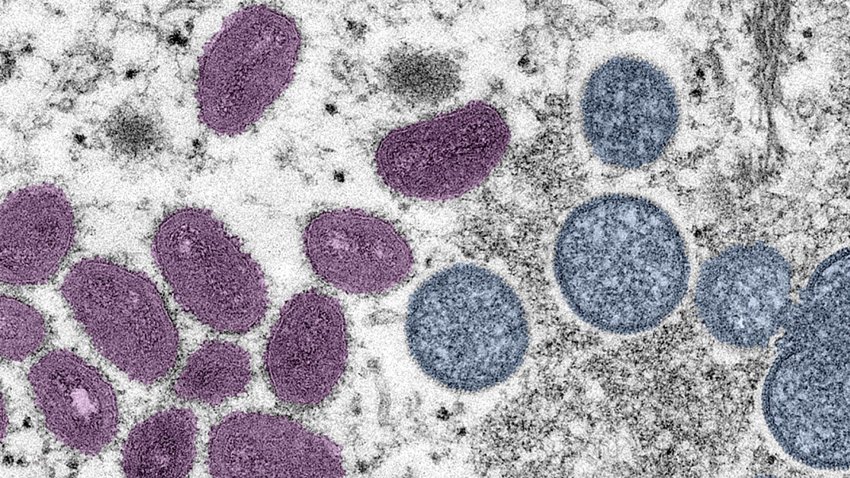-

Will fluoride go away when Trump takes office?
Dentists say fluoridated water was one of the most significant public health advances in recent memory. The incoming administration may not see it that way.
-

Why is there fluoride in drinking water?
Fluoride is added to drinking water to prevent tooth decay and reduce other dental-related illnesses, according to the American Dental Association and CDC.
-

What is Mycoplasma pneumoniae?
The Centers for Disease Control and Prevention has warned of an unusual increase in bacterial infections caused by Mycoplasma pneumoniae.
-

Diagnosed with disease he studied, California doctor puts his personal story at center of new class
Dr. Bryant Lin is hoping his cancer journey can be a teaching moment for future physicians.
-

Clinical trials sparking hope for Alzheimer's patients: ‘Holding my own'
A clinical trial is testing whether an existing drug could benefit patients with Alzheimer’s disease, in hopes of making symptom-improving medication more accessible for people experiencing mild cognitive impairment.
-

New stents for infants mean kids could avoid series of open heart operations
For decades, when babies with congenital heart defects needed stents, doctors would modify ones meant for adults so they would fit into much smaller hearts.
-

Why some doctors see a downside to notifying women about dense breasts
Due to a new FDA rule, women 40 and older in every state are now receiving letters about their breast density along with their standard mammogram results.
-

What are PFAS?
Commonly referred to as “forever chemicals,” PFAS are found in many everyday products and even inside our bodies. So what are they?
-

Brett Favre's Parkinson's diagnosis reignites questions about football's link to brain disease
Research suggests that concussions from football can raise the risk of Parkinson’s and other neurodegenerative diseases.
-

Black women are more likely than white women to die of all types of breast cancer
Black women are more likely than white women to die from even the most treatable types of breast cancer, a study published Tuesday in the Journal of Clinical Oncology found.
-

Syphilis is at its highest levels since the 1950s. Here's how experts are trying to fix that.
Doctors and public health workers across the U.S. are racing to develop innovative and unconventional strategies to test and treat people for the infection.
-

Their loved ones died after receiving pig organ transplants. The families have no regrets.
Four people have received hearts or kidneys from pigs. Some of their relatives recount a roller coaster of hope and uncertainty.
-

From cycle syncing to tampons: Dr. Streicher sets the record straight on women's health myths
Dr. Lauren Streicher, a clinical professor of gynecology, joins “Chicago Today” to bust common health myths, from the hype around cycle syncing to the truth about organic tampons.
-

Some types of HPV may affect men's fertility, new study suggests
Scientists have long considered that the world’s most common sexually transmitted infection, human papillomavirus, or HPV, may be a driver of infertility.
-

What is mpox?
Mpox, formerly known as monkeypox, is a virus first discovered in 1958 that causes fever, headache, muscle aches and exhaustion and eventually painful, fluid-filled blisters, or “pox,” over the body.
-

15-year-old Virginia scientist created a soap that could treat skin cancer, named Time's 2024 Kid of the Year
Bekele, from Fairfax, Virginia, is being recognized for developing an affordable bar of soap that could make delivering medications for skin cancers, including melanoma, more accessible.
-

What you need to know about ketamine
Ketamine is a prescription medication which is also abused recreationally under the street names Special K, Super K and Vitamin K. Here’s what you need to know.
-

FDA approves new blood test to screen for colon cancer
A blood test to screen for colon cancer was approved by the Food and Drug Administration on Monday. It’s from Guardant Health and it’s called Shield.
-

Infants' tongue-tie may be overdiagnosed and needlessly treated, American Academy of Pediatrics says
A prominent doctors’ group worries that a condition in infants that can affect breastfeeding known as tongue-tie is being overdiagnosed in the U.S. and too often treated with unnecessary surgery.
-

Blood tests for Alzheimer's may be coming to your doctor's office. Here's what to know
New research suggests certain blood tests could help doctors diagnose Alzheimer’s disease faster and more accurately.

